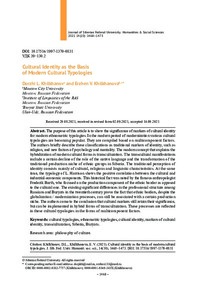Показать сокращенную информацию
Cultural Identity as the Basis of Modern Cultural Typologies
| Автор | Khilkhanov, Dorzhi L. | en |
| Автор | Khilkhanova, Erzhen V. | en |
| Автор | Хилханов, Д. Л. | ru_RU |
| Автор | Хилханова, Э. В. | ru_RU |
| Дата внесения | 2021-10-21T04:57:14Z | |
| Дата, когда ресурс стал доступен | 2021-10-21T04:57:14Z | |
| Дата публикации | 2021-10 | |
| URI (для ссылок/цитирований) | https://elib.sfu-kras.ru/handle/2311/144696 | |
| Аннотация | The purpose of this article is to show the significance of markers of cultural identity for modern ethnometric typologies. In the modern period of modernization various cultural typologies are becoming popular. They are compiled based on multicomponent factors. The authors briefly describe these classifications as traditional markers of identity, such as religion, and new factors of psychology and mentality. The modern concept that explains the hybridization of modern cultural forms is transculturation. The transcultural manifestations include a certain decline of the role of the native language and the transformation of the traditional production niche of ethnic groups in Siberia. The traditional perception of identity consists mainly of cultural, religious and linguistic characteristics. At the same time, the typologу of L. Harrison shows the positive correlation between the cultural and industrial-economic components. This historical fact was noted by the famous anthropologist Frederik Barth, who focused on the production component of the ethnic border as opposed to the cultural one. The existing significant differences in the professional structure among Russians and Buryats in the twentieth century prove the fact that ethnic borders, despite the globalization / modernization processes, can still be associated with a certain production niche. The authors come to the conclusion that cultural markers still retain their significance, but can be implemented in hybrid forms of transculturation. These processes are reflected in these cultural typologies in the forms of multicomponent factors | en |
| Аннотация | Цель данной статьи – показать значение маркеров культурной идентичности для современных этнометрических типологий. В современный период модернизации популярными становятся различные культурные типологии. Как правило, они составляются на основе многокомпонентных факторов. В своей статье мы показываем, что в основе этих классификаций лежат как традиционные маркеры идентичности, например религия, так и новые комплексные факторы, относящиеся к психологии и мировоззрению. Современной концепцией, объясняющей неизбежную гибридизацию культурных форм, является транскультурация. К транскультурным проявлениям мы относим снижение роли родного языка и трансформацию традиционной производственной ниши этносов в условиях Сибири. Традиционное восприятие идентичности складывается преимущественно из культурных, религиозных и языковых признаков. В то же время рассмотренные нами типологии (например, типология Л. Харрисона) обосновывают взаимосвязь культурной и производственно-экономической составляющей. Данный факт отмечал норвежский антрополог Фредерик Барт, который акцентировал внимание на производственной составляющей этнической границы в противовес культурным. Существующие значимые различия в выборе профессий у русских и бурят в ХХ веке доказывают тот факт, что этнические границы, несмотря на глобализационные/модернизационные процессы, могут быть связаны с определенной производственной нишей. В качестве заключения мы отмечаем, что культурные маркеры по-прежнему сохраняют свое значение, но могут реализовываться уже в гибридных формах транскультурации. Данные процессы отражены в рассмотренных типологиях в виде многокомпонентных факторов | ru_RU |
| Язык | en | en |
| Издатель | Сибирский федеральный университет. Siberian Federal University | en |
| Тема | cultural typologies | en |
| Тема | ethnometric typologies | en |
| Тема | cultural identity | en |
| Тема | markers of cultural identity | en |
| Тема | transculturation | en |
| Тема | Siberia | en |
| Тема | Buryats | en |
| Тема | культурные типологии | ru_RU |
| Тема | этнометрические типологии | ru_RU |
| Тема | культурная идентичность | ru_RU |
| Тема | маркеры культурной идентичности | ru_RU |
| Тема | транскультурация | ru_RU |
| Тема | Сибирь | ru_RU |
| Тема | буряты | ru_RU |
| Название | Cultural Identity as the Basis of Modern Cultural Typologies | en |
| Альтернативное название | Культурная идентичность как основа современных этнометрических типологий | ru_RU |
| Тип | Journal Article | en |
| Контакты автора | Khilkhanov, Dorzhi L.: Moscow City University Moscow, Russian Federation; dorjikh@mail.ru; ORCID: 0000-0002-9382-7757 | en |
| Контакты автора | Khilkhanova, Erzhen V.: Institute of Linguistics of the RAS Moscow, Russian Federation; Buryat State University Ulan-Ude, Russian Federation; erzhen133@mail.ru; ORCID: 0000-0001-9369-343X | en |
| Контакты автора | Хилханов, Д. Л.: Московский городской педагогический университет Российская Федерация, Москва | ru_RU |
| Контакты автора | Хилханова, Э. В.: Институт языкознания РАН Российская Федерация, Москва; Бурятский государственный университет Российская Федерация, Улан-Удэ | ru_RU |
| Страницы | 1468–1473 | ru_RU |
| DOI | 10.17516/1997-1370-0831 | |
| Журнал | Журнал Сибирского федерального университета. Гуманитарные науки. Journal of Siberian Federal University. Humanities & Social Sciences; 2021 14 (10) | en |

